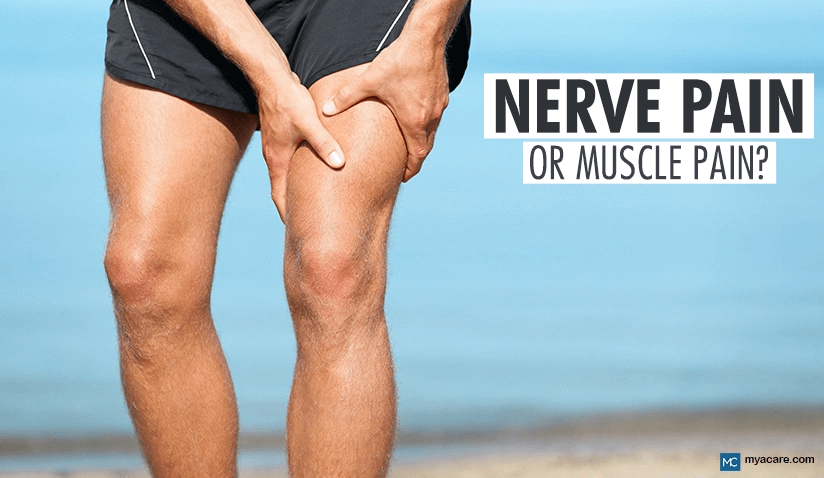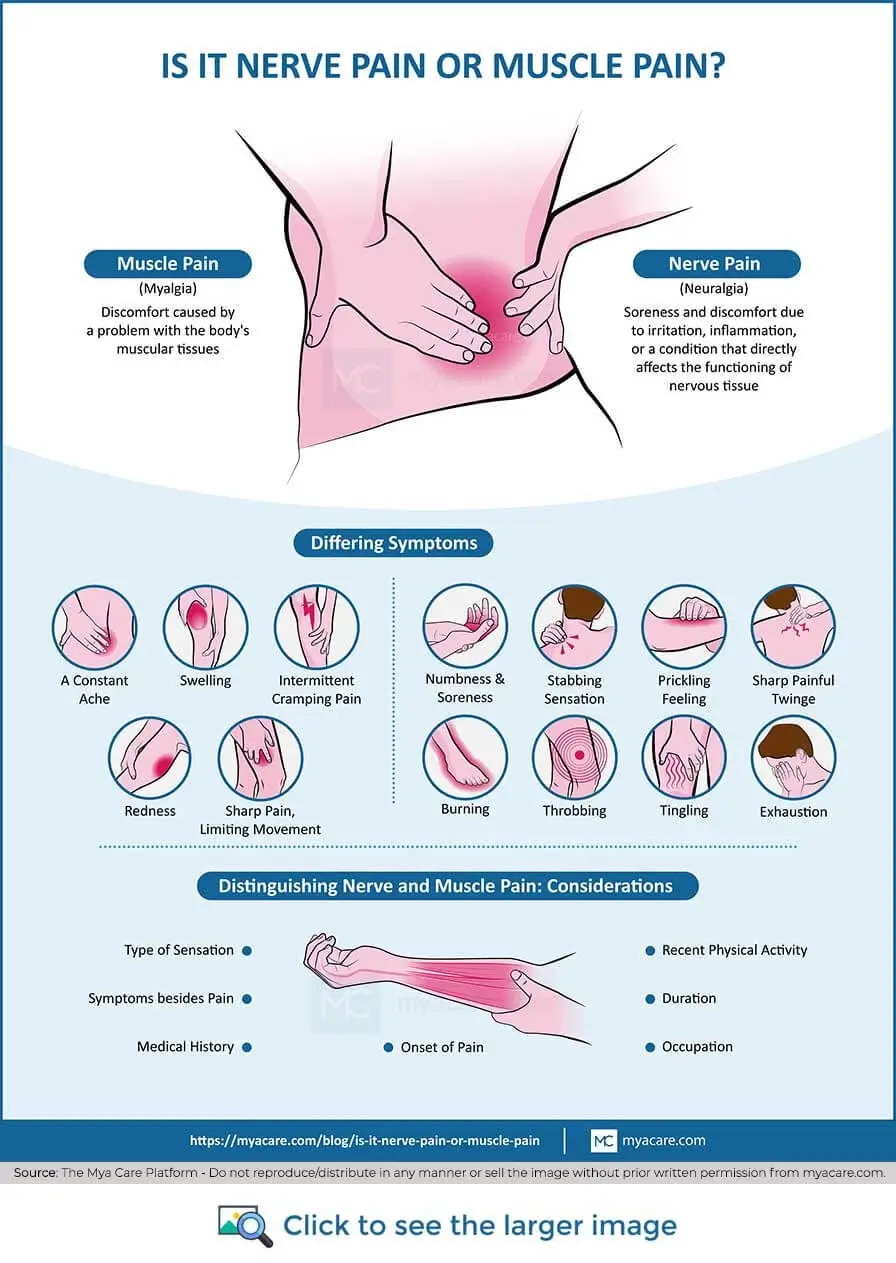Is It Nerve Pain or Muscle Pain?

Article Updated 30 July 2024
Conditions that cause pain are quite common, but treatment works best if the source of pain and discomfort is known. The nervous system innervates every organ in the body, which means that a person can experience nerve pain in any structure of the body. It is because of the nervous system that people experience painful stimuli in the first place.
The way the system works is a signal is sent along a nerve to the brain, where it is interpreted. Feeling pain is important because it is a warning that something is wrong. However, pain is debilitating and can be difficult to treat, particularly if the origin of the pain is not known.
This article examines the differences between nerve and muscle pain and explains some of the causes of each type of pain. The symptoms and treatment options for nerve and muscle tenderness are also discussed.
What is Nerve Pain?
Nerve pain (neuralgia) is when there is irritation, inflammation, or some other condition that directly affects the functioning of nervous tissue, resulting in soreness and discomfort.
What Causes Nerve Pain?
There are many reasons why nerves hurt.
- Shingles is an infection due to the Herpes zoster virus. This directly affects cells along a nerve root, resulting in excruciating pain, which can last for a while.
- Diabetic neuropathy is another cause of nerve tenderness and problems. This is when elevated blood sugar levels damage nerves and their vascular supply.
- Small nerve fiber neuropathy can cause a burning, painful sensation in the feet. This can be due to diabetes or even a vitamin B12 deficiency.
- Structures can press against nerves. For instance, in sciatica, bone presses on the sciatic nerve, resulting in nerve pain.
- Nerve irritation. Trigeminal neuralgia is a painful sensation in the face due to an irritated trigeminal nerve.
- Nervous system disorders such as Multiple Sclerosis and Parkinson’s disease can cause neuralgia.
Symptoms of Nerve Pain
The following are sensations associated with nerve pain:
- Tingling
- Stabbing
- Prickling feeling
- Sharp painful twinge
- Burning
- Throbbing sensation
- Numbness or lack of sensation along with soreness
- Exhaustion associated with pain
Treatment Options for Nerve Pain
Treatment will depend on the cause of pain and may include certain medications such as anticonvulsants. These can work for trigeminal neuralgia, for instance. However, it is best if the underlying condition can be treated to reduce the pain. For example, better control of blood sugar levels in the case of diabetics.
What is Muscle Pain?
Muscle pain is also known as myalgia, and it is the discomfort caused by a problem with the body's muscular tissues. Most often, people experience pain associated with the skeletal muscles, which are attached to the bones.
The sensation of pain in the muscles is a result of nociceptor activation. Nociceptors are special sensory neurons found in muscle cells and other parts of the body. These nociceptors respond to painful stimuli and send the message along the nerve cells to the brain, where the painful stimulus is interpreted.
What Causes Muscle Pain?
- Muscles can be strained during exercise and from overuse or injury. Certain occupations involving manual labor can cause overuse of muscles, as can sports. Muscles can be strained or sprained due to repetitive motion or from stresses placed on them. People may injure their muscles if they don’t warm up properly before exercise.
- Stress can cause pain and stiffness in muscles. A good example of this is a tension headache, which causes due to the muscles in the head stiffening and tightening up.
- Electrolyte imbalances caused by dehydration can produce painful muscle spasms in the calf muscles.
- There are also health conditions that can produce muscle pain. Examples include ALS, fibromyalgia, arthritis, autoimmune illnesses such as lupus or the inflammatory condition polymyositis, and the brain disorder cervical dystonia.
- Menstruation and childbirth cause contractions of the uterine muscles, which can be painful.
- Viral infections such as influenza and Covid often cause muscle pain and stiffness.
- Tick-borne infections such as Lyme disease and Rocky Mountain Spotted Fever frequently cause muscle pain.
Symptoms of Muscle Pain
Muscle pain usually feels different from nerve pain. Nerve pain may feel worse, but this is not always the case. Listed below are the sensations and associated symptoms of muscle pain.
- A constant ache
- A sharp sensation with difficulty moving the muscle
- Pain that comes and goes in a cramping fashion
- A reddened area over the affected muscle
- Swelling in the area where you feel pain
Treatment Options for Muscle Pain
Muscle problem symptoms vary depending on the cause of the pain, which helps determine the most appropriate treatment.
There are various ways to treat muscle pain, depending on the cause. For instance, one can treat muscle spasms from dehydration by drinking water and eating healthy to get the needed electrolytes. Analgesics and anti-inflammatories help with pain from infections and inflammation.
Cold compresses can help with muscles injured by overuse that have been strained or sprained. Relaxation and rest helps to treat tension headaches.
Heat works well for menstruation cramps, and a woman can sometimes be given an epidural to ease the pain of childbirth.
What to Consider When Distinguishing Nerve Pain and Muscle Pain
Telling myalgia and neuralgia apart depends on the type of sensation and what recent activities or illnesses were present. For example, a person who recently exercised and is now experiencing steady pain in the legs and arms is most probably suffering from muscle pain. An individual diagnosed with shingles will have sharp and burning nerve pain. With shingles, there will also be a rash that follows a certain nerve root on the body.
How Muscle and Nerve Pain Differs:
- Differences in the duration and intensity of the pain: Muscle pain often begins after you use a particular muscle in a specific action, and the muscle usually feels achy and sore. In contrast, nerve pain is often a sharp and burning sensation that can’t be linked to a specific event. Nerve pain may also present as tingling or numbness.
- Differences in the location of the pain: Nerve pain radiates while muscle pain does not. Muscle pain remains localized to where an injury or sprain has occurred.
- Differences in the progression of the pain: Nerve pain does not improve over time, while muscle pain will usually feel better after a couple of days unless you have a severe injury like a torn hamstring.
- Effect of stretching: A minor muscle injury can feel better if you stretch but this is not the case with nerve pain.
When To See A Doctor
There are some signs that you should see a doctor:
- If you were in an accident such as had a fall or car accident
- Serious pain that does not go away after a few days and that prevents you from doing what you normally do
- Other signs like increasing weakness, numbness or fever
- Home treatments that are not helping to alleviate your discomfort
- Worsening of the pain
- A history of illnesses like cancer or an immune deficiency disease
- Unintentional weight loss
- Bladder or bowel incontinence
In diagnosing pain, a doctor will take into account:
- Type of pain (type of sensation)
- Other symptoms, in addition to pain
- Medical history
- When the pain first began
- Duration of the pain
- Person’s occupation
- Any recent physical activity

Conclusion
While it can be hard to tell nerve and muscle pain apart, the sensation that is felt along with a medical history and recent activity can help with diagnosis. Nerve pain is stabbing, tingling, and sharp while muscle pain is dull and steady or crampy and spasmodic. Treatment of both types of pain depends on the underlying cause.
Frequently Asked Questions
Can a pinched nerve feel like muscle pain?
Yes, it is possible because when a nerve is pinched it can affect the nearby muscle. It can also lead to some weakness in the muscle. If you experience nerve pain after working out then this can be due to a pinched nerve.
Can nerve pain feel like tight muscles?
Yes, this is because an entrapped nerve can make the surrounding muscles feel tight.
When should I be worried about muscle pain?
You should be concerned if the pain in your muscle lasts for longer than 3 days or if you have additional symptoms like weakness, dizziness, a fever, or a stiff neck. These could indicate a serious problem.
How to tell if back pain is muscular?
When it comes to back muscles and nerves, the pain remains localized in your back, and it does not radiate into your legs or buttocks. However, in nerve conditions like sciatica, pain does radiate.
What does nerve pain in my leg feel like?
Nerve pain in the leg will feel like a burning or stabbing sensation or feel as though you are being shocked.
Why are my muscles burning without exercise?
Burning sensation in the muscles could be due to illnesses such as Lyme disease or fibromyalgia or could even be a reaction to a medication. Infections by bacteria or viruses could cause burning muscles as well.
Do nerves take longer to heal than muscles?
Nerves do take longer to heal than muscles. Muscles can often heal in about 6 weeks, but nerves may take 4 months or more, depending on the extent of the damage.
To search for the best Orthopedics Healthcare Providers in Croatia, Germany, India, Malaysia, Singapore, Spain, Thailand, Turkey, Ukraine, the UAE, UK and the USA, please use the Mya Care search engine.

Dr. Rae Osborn has a Ph.D. in Biology from the University of Texas at Arlington. She was a tenured Associate Professor of Biology at Northwestern State University, where she taught many courses to Pre-nursing and Pre-medical students. She has written extensively on medical conditions and healthy lifestyle topics, including nutrition. She is from South Africa but lived and taught in the United States for 18 years.
Sources:
Featured Blogs



